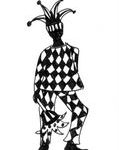first person
On Soft Cinema: Mission to Earth

Lev Manovich describes a filmic methodology for the information age: narratives structured on the logic of databases. The delegation of a large part of the editing Mission to Earth to a computer results in a product that is "between narrative and a search engine."
The Creation of Floyd the Robot in Planetfall
Steve Meretzky reflects on one of the earliest (1982) NPCs (non-player characters) to evoke an emotional investment from videogame players. Meretzky draws attention to the fact that character development - integral to fiction and film - is not often emphasized in game design.
On Solitaire

Helen Thorington describes Solitaire, a program for generating fiction in the same line as the projects explained by Chris Crawford and D. Fox Harrell elsewhere in this thread.
Pax, Writing, and Change

Stuart Moulthrop argues that Pax answers John Cayley's question, "What would textual instruments look like?" Moulthrop maintains that one plays this electronic text (in the manner of a musical instrument) as much as one reads it.
Fretting the Player Character

Nick Montfort argues that the contentious notion of the "player character" usefully constrains and makes possible the player's interaction with the gameworld. He considers the possibility that in interactive fiction one plays the character (like an actor plays a role) rather than playing the game.